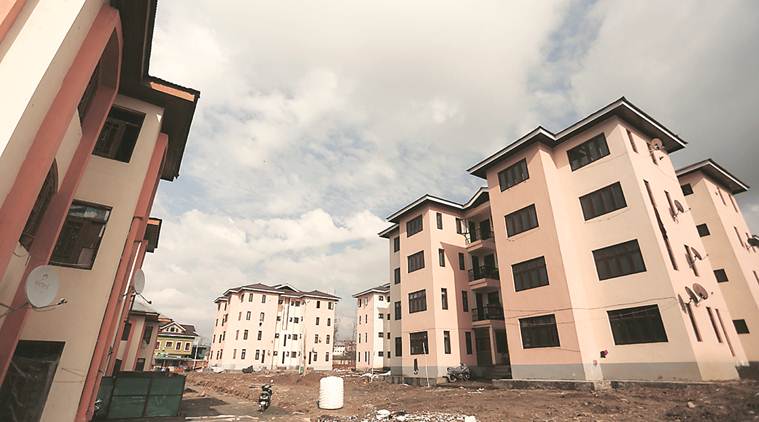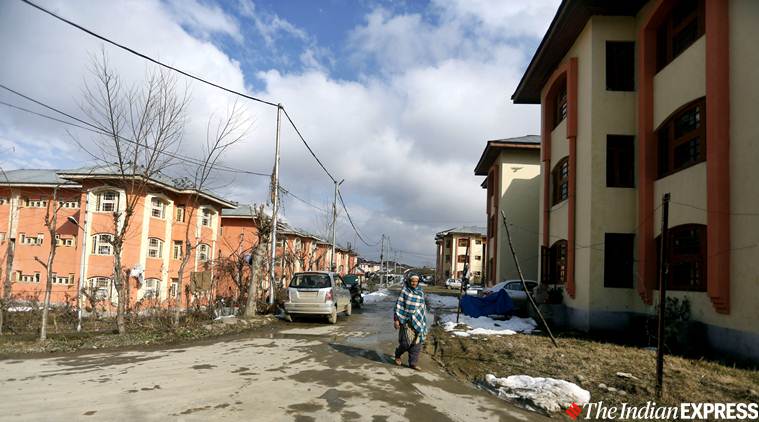Kashmiri Pandit colonies in Valley safe, fenced and gated: ‘It’s like dividing us again’
by Basharat MasoodWritten by Basharat Masood, Nirupama Subramanian | Pulwama | Updated: January 31, 2020 1:48:37 pm

The transit accommodation at Sheikhpora in Budgam. Over 500 families live in this gated colony. (Express photo: Shuaib Masoodi)
A high concrete wall, topped by a metal sheet running over its entire length. Concertina wire provides the finishing touch. The gates are shut and bolted from inside. J&K police and Special Operations Group personnel guard the premises. Inside are rows of small identical single-storey homes with red sloping roofs and painted yellow windows, all pre-fab structures made of asbestos sheets.
It is a gated community even realtors would hesitate to promote, but this, and five others across Kashmir Valley — three of them concrete three-storeyed structures — are the most visible experiments of “return” for Pandits who fled the Valley in 1990, threatened by a militancy that had just then turned full-blown.
And as migrants renew their demand that the government “resettle” them back in Kashmir and provide them security to live in the Valley, this might be the model that the government may find it easy to replicate.
This “Pandit colony”, which has 60 portacabins, is home to about 70 migrant Pandits – some are shared — who were employed by the government in Kashmir back in 2010 under the Prime Minister’s Return & Rehabilitation Scheme. It was meant to be transit accommodation until “returnees” reintegrated with the local community. At least in this respect, time has stood still these last 10 years.

Far from Pulwama, in Budgam district’s Sheikhpora is another Pandit colony, with multi-storeyed housing. Five hundred migrants, all employed in various government departments in Kashmir, live in this colony, with their families. (Express photo: Shuaib Masoodi)
On this Wednesday morning, the premises are deserted. Most returnees, who are employed as teachers, have returned to Jammu for the annual school vacation. The police guards say only a handful of others employed in other government departments in junior posts remain, but they are away at work. Only a few are originally from Haal. None of their families have shifted here. They come for a couple of months in the summer, say the guards. Then they go right back to Jammu, which has been their home for the last 30 years.
Read Part 1 | Kashmiri Pandits In Kashmir: Those who stayed back have a home — and a roomful of regret
“Everything is normal. Those who live here go out to work everyday. They face no problems at all from the local residents,” a police guard said. In all, seven policemen and 10 SOG personnel guard the premises.
But local residents do not see the Pandit colony as a solution, and believe it could become part of the problem.
Sajjad Hussain Dar, a resident of Haal, says Pandits are welcome to return. “They should come back and stay in their homes. That is what we all want. But if they want to stay in colonies like this one, that is a different thing. Then they become separate. It is not like having neighbours. We are not able to meet and greet them as we would in the normal way. When people come and live in their own homes, we know who they are. Our parents and grandparents knew their’s. When they live in colonies, we don’t know who they are, where they are from,” Dar said.
For the Kashmiri Muslims of Haal, the ideal is Omkarnath Bhat, who is in his late 80s, and was the only one who did not leave with the other Pandits in 1990. He lives in his crumbling house with his son, daughter-in-law and their three sons, a few hundred metres away from the “Pandit colony”, in Haal’s original Pandit locality, once home to the most prosperous and well to do Kashmiri Pandit families until they all left.
Now, some two dozen houses rise silently from the snow, testimony to a past grandeur even in their dilapidated and crumbling condition. One belongs to a former judge of the Supreme Court, another to a well known Delhi doctor. Bhat’s eldest grandson Abhilash, 26, managed just last year to get a job in the PWD department in Pulwama, a rare third-generation non-migrant Pandit to have found government employment.
Abhilash, who has a BTech degree from a college in Ambala, Haryana, too sounds a cautious note on colonies. “From the migrants’ point of view, colonies are okay, but not from the point of view of locals. By living in colonies, they become separate. Outsiders are not allowed in. It becomes a barrier between people,” he said.
His grandfather said the family had lived here all these years “only with the support of our neighbours”. The only thing he complained about was the lack of water in his house, and loneliness, “because there are some matter, like religion, that you can discuss only with your own people”.
Showkat Ahmad, a neighbour, speaks with affection about the Bhat family. “We have lived as brothers and we will continue to do so. All the other Pandits are welcome to return. It would be good if they settle back with us in our village. Settling them in separate colonies is not a good idea. It would be like dividing us again and that would not be good – not for them (Pandits) and not for us (Muslims). We want harmony, and separation would only create animosity,” Ahmad said.
Far from Pulwama, in Budgam district’s Sheikhpora is another Pandit colony, with multi-storeyed housing. Five hundred migrants, all employed in various government departments in Kashmir, live in this colony, with their families. Abhay Kaul, a 23-year-old, who was born and grew up in Jammu, studied there, and is now employed Village Level Worker in the Rural Development department, lives here with his mother who works in the Urban Development department. His father has a business in Jammu, and lives there. Kaul says the accommodation in Sheikhpora is better than what is available for migrants in Jammu. But it is clear that for him, home is Jammu, where his family has built their own house, even though he says, “Jammu people don’t like Kashmiri Pandits”.
Though the security situation is more relaxed here than in Pulwama, the CRPF guards this colony, and lets people in only after a scrutiny of their IDs.
There are also 31 non-migrant families living in Sheikhpora. “The police told us they cannot provide security to isolated families, and forcibly brought us here. The conditions here are awful, and because we are non-migrant, we get second class treatment even inside this colony,” said Deepak Bhat, who works as a technician with an electrical appliances company. He, his wife and daughter, his parents and his sister share a three-roomed apartment. “Even the attic at our home in Lalgam was better than this living room. Is this even a life? What’s the point of living like a refugee all your life” he said, adding “When I say these things, people say I’ve become anti-India”.
Sanjay Tickoo, who heads Kashmiri Pandit Sangharsh Samiti, an association of non-migrants, called the colonies “an experiment that failed”. Tickoo lives in the Bar Bar Shah neighbourhood, a maze of lanes and houses in Habbakadal, once a hub of Kashmiri Pandits. Now there are only two or three Pandit families left here.
“My life here is 24×7. When I go out, people know me, I know them. I can call on my neighbours for help, I can visit them in good times and bad. But for those in the colonies, life is 9 to 5 only. They go out of the colony to work, and shut themsleves up in their colony when they return,” he said. The issue of return, Tickoo said, is complex. Most of the Pandit families belonging to Srinagar had sold their homes. “Who wants to return? Those who are in their 80s now? Those in their 40s? Many are settled well outside in other cities, their children grew up outside. That kind of person will not be able to resettle here. People with children would not want to come here, as the education system is quite bad and is behind that in the rest of the country,” he said. Ultimately, said Tickoo, the migrant Pandits would have to decide “whether they wanted to return to live in ghettos”.
(Tomorrow: How Pandits see August 5 and their return)
📢 The Indian Express is now on Telegram. Click here to join our channel (@indianexpress) and stay updated with the latest headlines
For all the latest India News, download Indian Express App
0 Comment(s) *
* The moderation of comments is automated and not cleared manually by indianexpress.com.